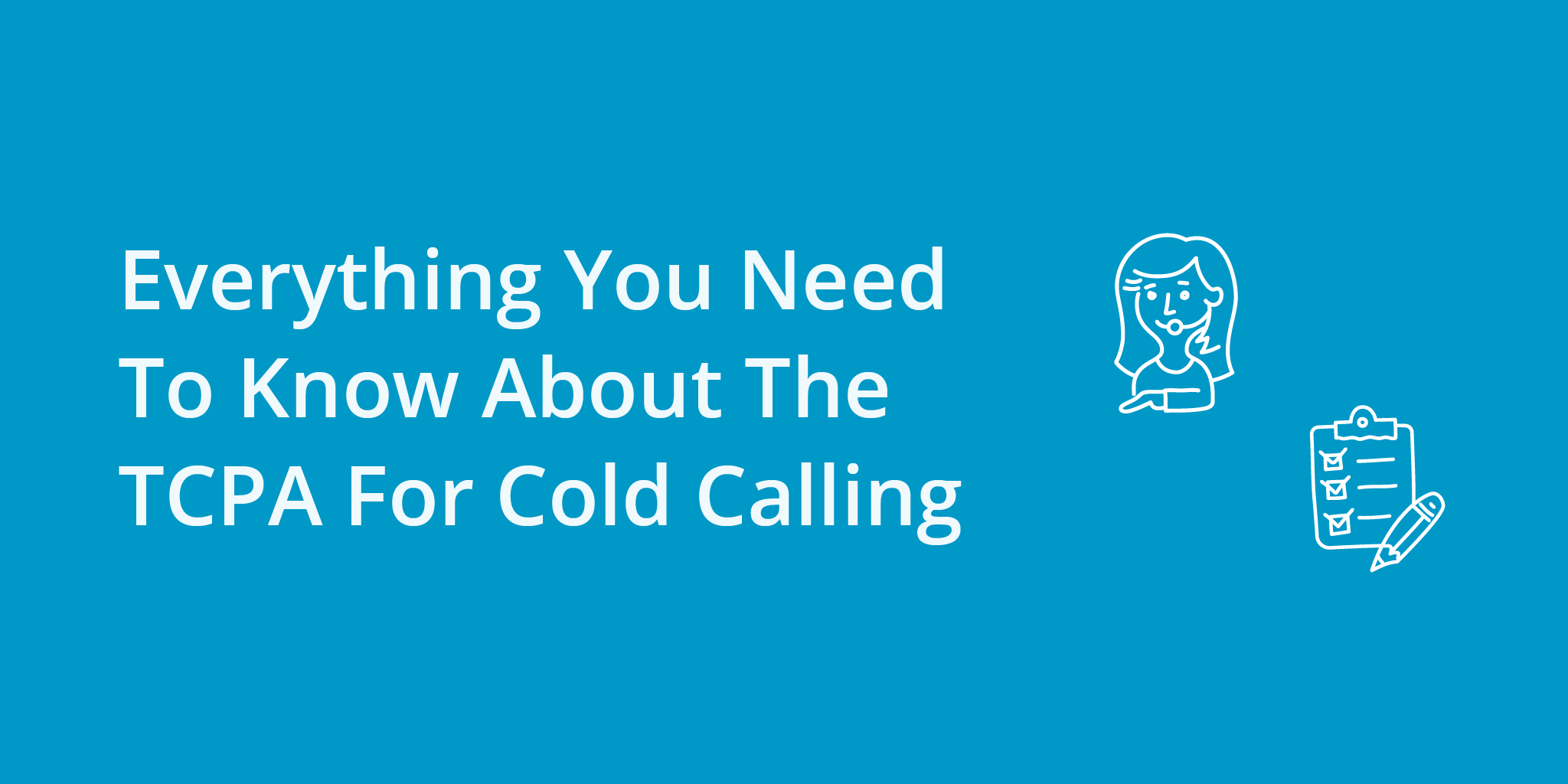- What are the TCPA Laws for Cold Calling?
- TCPA Autodialer Rules
- When Does the TCPA Require Prior Express Written Consent?
- TCPA Calling Hours
- Does the TCPA Govern Manually Dialed Calls?
- Other TCPA Exemptions
If you’re starting or leading an ououtbound saleseam, chances are you’ve had to consider calling and texting regulations. In the United States, there are a number of regulations that apply specifically to telemarketing calls. On of the largest pieces of legislation is the Telephone Consumer Protection Act (TCPA). Passed in 1991, this law aims to protect consumer privacy.
It can be difficult to parse through the FCC’s TCPA legal code (even the summary is complex). So we’ve done the hard work for you. In this article, we’ll explain the most important information you need to know for TCPA compliance when calling sales prospects.
What are the TCPA Laws for Cold Calling?
First things first, the TCPA laws were made to protect consumers from unwanted phone calls, text messages, and fax messages, especially those that are trying to sell a product or service. A good question to keep in mind when creating your own outbound sales campaign is, “Would I find it annoying to receive this call/message?”
Asking yourself this question is not a way get around following the rules. Rather, it’s a way to judge whether or not your communication will come off as helpful and positive or annoying and harassing in nature. When in doubt, it’s probably best not to make that call.

TCPA Autodialer Rules
The TCPA mostly restricts calls made with “automatic telephone dialing systems,” or systems that can store or produce telephone numbers created with a random or sequential number generator – and then dials those numbers. You might know these systems as “robocallers”.
Consumers are generally annoyed if they get a phone call from a business they’ve never heard of before, because their phone number happened to randomly generated. Wouldn’t you be? Plus, this method of sales goes against just about every piece of advice we’ve read about buyer personas.
Automatic telephone dialing systems are not the same as auto dialers – a common term used in the sales industry to describe phone software systems that can automatically dial down a list of numbers. Autodialers still require a sales person to be driving the software, and they do not generate phone numbers from scratch.
When Does the TCPA Require Prior Express Written Consent?
The TCPA prior express written consent requirement applies to telemarketers using robocalling platforms and/or automatic or pre-recorded voice systems. If an individual gives express written consent to be contacted via an automatic telephone dialing system, then a company can reach out to them using this method. Otherwise, it’s prohibited to call consumers with a robocalling system.
TCPA Calling Hours
Another rule the TCPA puts forth is the calling hours that companies can try to reach consumers. Businesses are only allowed to call between 8 a.m. and 9 p.m. local time (of the call recipient). However, general sales outreach best practices advise that sellers should only reach out during normal business hours (between 9 a.m. and 5 p.m. local time).
Does the TCPA Govern Manually Dialed Calls?
The short answer is no – if you are manually dialing and not using a robocalling system (or leaving an automated or pre-recorded message), your business is not subject to the TCPA laws.
However, in 2003, the TCPA was updated in coordination with the FTC, to establish a federal Do Not Call List. All businesses that call consumers for sales and marketing purposes (regardless of the telephone system they use) are required to comply with the Do Not Call list. Unless an individual on the National Do Not Call list has given your business prior express consent to be contacted, it is unlawful to contact them for telemarketing messages.
Businesses must also comply with the TCPA’s opt-out request rules. If a person requests to be removed from a calling list, the TCPA states that you must honor this opt-out and add them to an internal “Do Not Call” list.

Other TCPA Exemptions
There are certain types of businesses for which the TCPA does not apply. These companies are generally non-profit in nature, and due to this, they are not restricted by the TCPA. More specifically, calls that are made to landlines (NOT cell phones) and are:
- purely informational in nature (such as a flight delay or a school closure)
- debt collection calls
- political calls
- messages from charities
- calls from some healthcare providers (like a prescription pickup notification)
are legally allowed to contact you via robocall technology, even without prior express consent.
Final Thoughts
Understanding the Telephone Consumer Protection Act (TCPA) is crucial for anyone engaged in cold calling. This comprehensive legislation aims to protect consumers from unwanted telemarketing calls and establish guidelines for businesses conducting phone-based marketing campaigns.
By familiarizing oneself with the TCPA’s requirements and restrictions, businesses can navigate the complex landscape of cold calling while safeguarding consumer privacy and avoiding costly legal consequences.
Adhering to the TCPA not only ensures compliance with the law but also fosters a positive customer experience, ultimately contributing to the success and reputation of businesses in the long run. Check out our other article for more information on the rules that govern cold calling in the US.



